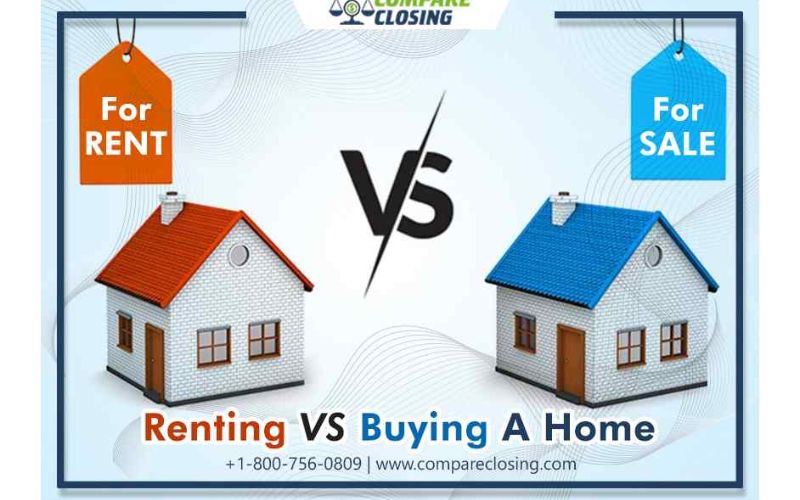When it comes to securing a place to live, one of the most significant decisions you’ll make is whether to buying vs renting a home. Each option comes with its own set of advantages and disadvantages, and the best choice depends on your financial situation, lifestyle, and long-term goals. Here’s a comprehensive comparison to help you make an informed decision.
Financial Considerations
Buying a Home:
- Down Payment and Mortgage: Purchasing a home requires a substantial down payment, typically ranging from 5% to 20% of the property’s value. This initial expense is a significant financial commitment. Once you’ve secured a mortgage, you’ll be responsible for monthly payments, which include both principal and interest.
- Equity Building: One of the key benefits of buying vs renting a home is the opportunity to build equity. As you pay down your mortgage, you increase your ownership stake in the property. Over time, this can be a valuable asset that appreciates in value, potentially providing a profitable return if you decide to sell.
- Maintenance Costs: Homeownership comes with ongoing maintenance and repair costs. You are responsible for everything from fixing leaky faucets to replacing the roof. These costs can add up and should be factored into your budget.
Renting a Home:
- Lower Upfront Costs: Renting typically requires a security deposit and the first month’s rent, which are significantly lower than a home down payment. This lower barrier to entry makes renting a more accessible option for many people.
- Predictable Expenses: Renters generally have fewer financial surprises. Most rental agreements include property maintenance and repairs, and renters often have predictable monthly payments. This can make budgeting simpler and more manageable.
- No Equity Building: Unlike homeowners, renters do not build equity in the property. Monthly rent payments go to the landlord and do not contribute to ownership or asset accumulation.
Flexibility and Stability
Buying a Home:
- Long-Term Stability: Owning a home provides long-term stability. You have the freedom to make modifications and improvements to the property. Homeownership can offer a sense of permanence and stability, which can be particularly appealing for families.
- Market Fluctuations: Homeownership can be affected by market fluctuations. Property values may rise or fall based on the real estate market and economic conditions. While this can lead to significant financial gains, it can also result in losses if property values decline.
Renting a Home:
- Flexibility: Renting offers greater flexibility. If your job requires relocation or if you desire a change in lifestyle, renting allows you to move more easily without the burden of selling a property. This can be advantageous for those who anticipate changes in their personal or professional lives.
- No Market Risks: Renters are not affected by property market fluctuations. You don’t need to worry about the market value of your home or how it might impact your financial situation.
Tax Benefits and Ownership Costs
Buying a Home:
- Tax Deductions: Homeowners can benefit from tax deductions on mortgage interest and property taxes, which can result in substantial savings. These deductions can make homeownership more financially attractive.
- Long-Term Investment: Buying a home is often considered a long-term investment. If property values increase, you may benefit from significant financial gains when you sell. Additionally, owning a home can provide financial security in retirement if you have a paid-off mortgage.
Renting a Home:
- No Tax Benefits: Buying vs renting a home do not receive tax benefits related to property ownership. All tax benefits are associated with owning a home, not renting.
- No Long-Term Investment: Renting does not offer the same investment potential as buying a home. You will not see a return on your rental payments or gain from property appreciation.
Lifestyle and Personal Preferences
Buying a Home:
- Customization: Homeownership allows you to personalize and renovate your space. From painting walls to remodeling kitchens, you have full control over how your home looks and feels.
- Community Involvement: Owning a home often fosters a deeper sense of community involvement. As a homeowner, you may become more invested in local issues and neighborhood activities.
Renting a Home:
- Maintenance-Free Living: Renters typically enjoy a maintenance-free lifestyle, as landlords are responsible for most repairs and upkeep. This can free up time and reduce stress.
- Less Commitment: Renting requires less long-term commitment. If your circumstances change, you can usually move without the complexities of selling a property.
Conclusion
Choosing between buying vs renting a home ultimately depends on your financial situation, lifestyle preferences, and long-term goals. Buying a home offers the potential for equity building and stability but comes with significant upfront costs and ongoing responsibilities. Renting provides flexibility and lower initial costs but lacks the investment potential and customization options of homeownership.
Carefully consider your financial readiness, life plans, and personal preferences before making a decision. Whether you choose to buy or rent, ensure that the choice aligns with your current needs and future aspirations.



